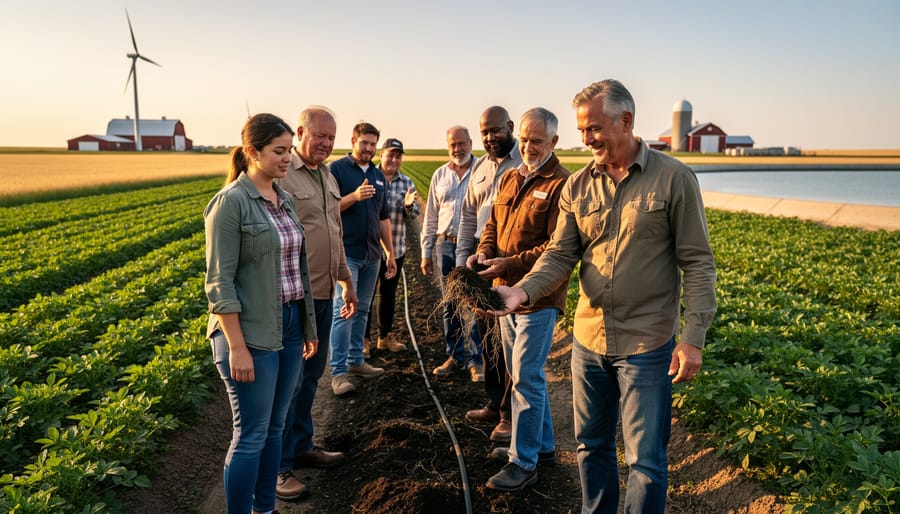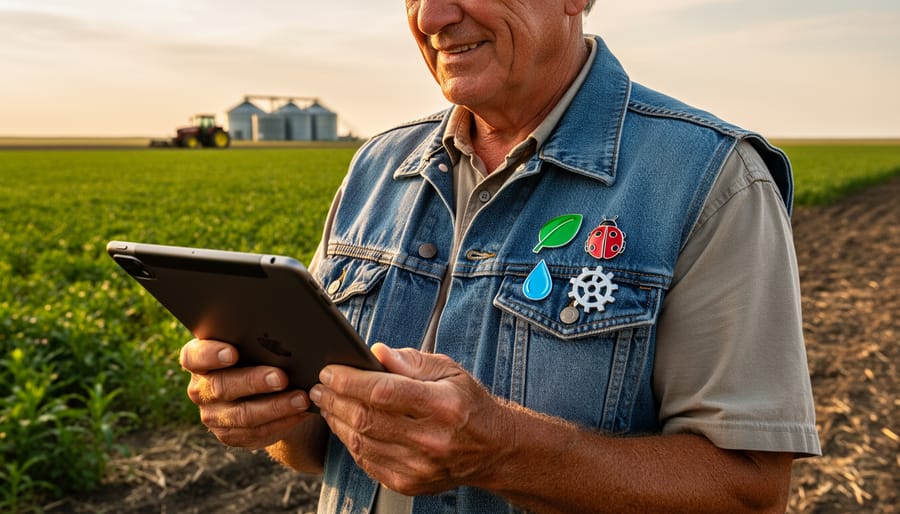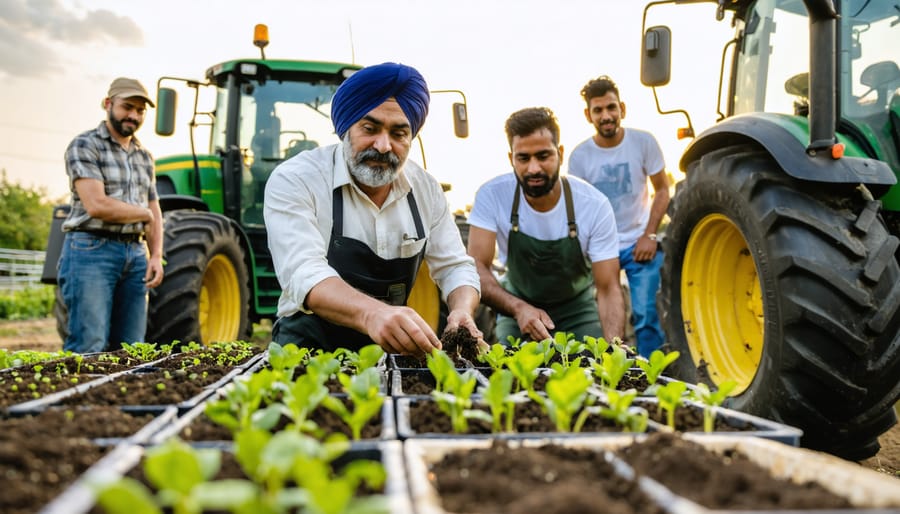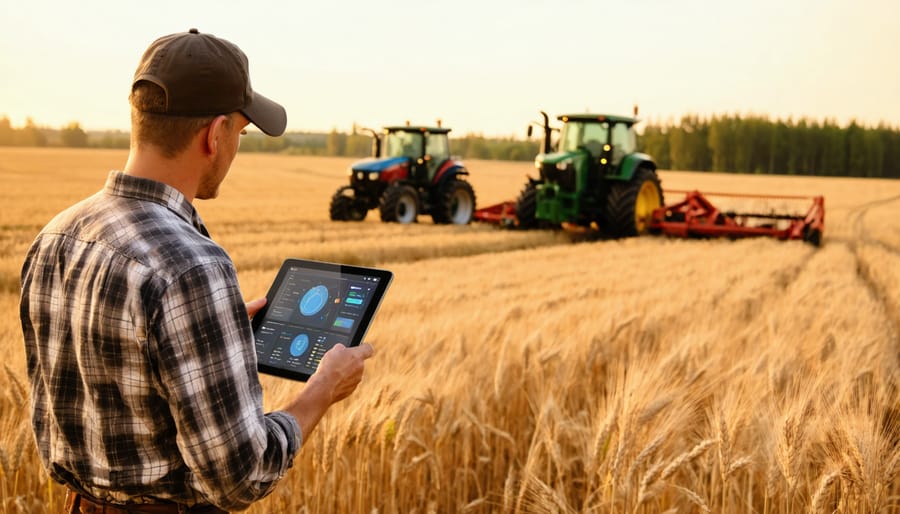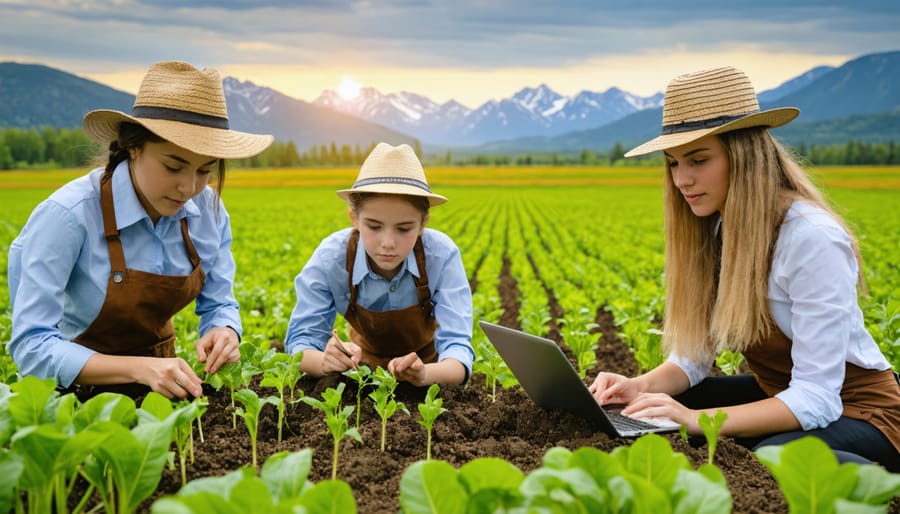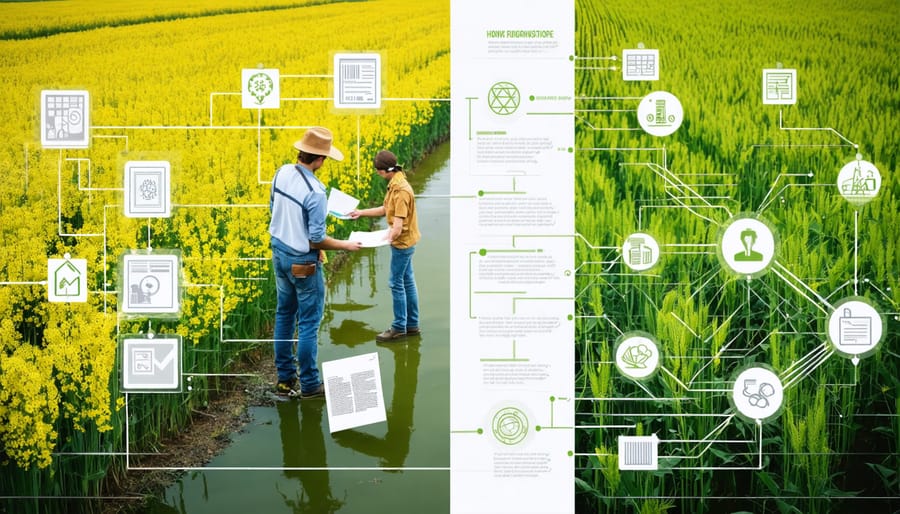Modern farmers are reshaping agriculture through continuous education, transforming traditional practices into sustainable, technology-driven operations that feed millions. From precision agriculture workshops to hands-on regenerative farming courses, Canadian agricultural education has evolved far beyond basic crop management.
In Alberta’s farming communities, where fourth-generation farmers work alongside tech-savvy newcomers, education serves as the crucial bridge between time-tested wisdom and cutting-edge innovation. Leading agricultural institutions now offer specialized programs combining practical field experience with digital literacy, soil science, and business management—essential skills for today’s competitive agricultural landscape.
The impact is clear: educated farmers consistently report 20-30% higher yields, better resource management, and increased profitability through informed decision-making. By investing in knowledge, farmers aren’t just improving their operations; they’re becoming environmental stewards, business strategists, and community leaders.
Whether through formal degree programs, targeted workshops, or online learning platforms, farmer education has become the cornerstone of sustainable agriculture. This investment in human capital is transforming Canadian farms into resilient, adaptive enterprises ready to meet the challenges of feeding a growing global population while preserving our precious agricultural heritage.
The New Face of Agricultural Learning in Alberta
Digital Learning Platforms
Alberta farmers now have unprecedented access to learning opportunities through various digital platforms designed specifically for agricultural education. From smartphone apps to comprehensive online courses, these digital farming tools are transforming how knowledge is shared within the farming community.
Popular platforms include the Alberta Farm Knowledge Network, which offers on-demand webinars and interactive courses covering topics from soil health to precision agriculture. The Canadian Agricultural Partnership’s online learning portal provides free access to expert-led sessions and practical workshops that farmers can complete at their own pace.
Mobile learning apps have become particularly valuable for busy farmers, offering quick access to weather updates, crop management guidelines, and pest identification tools. Many of these platforms also feature community forums where farmers can share experiences and seek advice from peers across the province.
The Agriculture and Agri-Food Canada’s digital learning hub has expanded its offerings to include virtual reality demonstrations of advanced farming techniques and equipment operation, making complex concepts more accessible and engaging for learners of all experience levels.

Hands-on Workshop Programs
Hands-on workshops form the backbone of practical farmer education across Alberta, offering immersive learning experiences throughout the growing season. These programs typically run from early spring through late fall, providing farmers with real-time solutions for seasonal challenges.
Popular workshops include soil health assessments, where participants learn to analyze soil composition and implement sustainable management practices. During these sessions, farmers work directly with agricultural experts to collect soil samples and interpret test results on their own land.
The Crop Management Field School, hosted at various demonstration farms, allows participants to practice pest identification, learn integrated pest management techniques, and master precision agriculture technologies. Farmers can operate modern equipment and calibrate instruments under expert guidance.
Livestock handling workshops focus on low-stress animal management techniques, featuring demonstrations by experienced ranchers. These sessions often incorporate the latest research in animal behaviour and welfare standards specific to Canadian operations.
Many workshops incorporate peer-to-peer learning, where experienced farmers share their success stories and practical insights. This approach has proven particularly effective, with participating farms reporting up to 20% improvement in operational efficiency following workshop implementation.
Sustainable Practices Through Expert Knowledge

Soil Health Management
Understanding and maintaining soil health is fundamental to successful farming operations across Alberta and beyond. Modern agricultural education programs emphasize the importance of soil conservation practices through hands-on workshops and field demonstrations. These programs teach farmers how to conduct regular soil testing, interpret results, and implement effective management strategies.
Local agricultural extension services offer comprehensive soil health workshops that cover essential topics like organic matter management, erosion control, and nutrient cycling. Farmers learn to identify soil structure issues, measure biological activity, and understand the impact of different tillage practices on soil quality.
Practical training includes instruction on cover cropping techniques suitable for Alberta’s climate, crop rotation planning, and the strategic use of green manures. Participants gain valuable skills in identifying soil organisms and understanding their role in maintaining fertile, productive land.
Many programs incorporate peer-learning opportunities where experienced farmers share their success stories in implementing regenerative soil practices. Through soil health management education, farmers develop the expertise to:
– Monitor soil moisture levels effectively
– Maintain optimal pH levels
– Reduce compaction issues
– Enhance water infiltration
– Build organic matter content
– Promote beneficial microorganism activity
These skills help farmers create more resilient agricultural systems while improving long-term productivity and sustainability.
Carbon Footprint Reduction
Carbon-smart farming practices are becoming increasingly important for Canadian agriculture, offering both environmental benefits and potential economic advantages. Through dedicated training programs, farmers across Alberta and beyond are learning effective methods to reduce their carbon footprint while maintaining or improving productivity.
Local agricultural extension services provide hands-on workshops where farmers learn about soil carbon sequestration techniques, including no-till farming and cover crop implementation. These practices not only capture carbon but also improve soil health and water retention. Many farmers report seeing improved yields within just a few growing seasons after adopting these methods.
The Canadian Agricultural Partnership offers specific training modules on precision agriculture technologies that help reduce fuel consumption and optimize input use. Farmers learn to use GPS guidance systems and variable rate technology to minimize overlapping during field operations, resulting in significant fuel savings and reduced emissions.
Expert-led sessions focus on sustainable livestock management practices, including rotational grazing and manure management strategies. These approaches help reduce methane emissions while improving pasture health. Success stories from Alberta farms show that implementing these practices can lead to a 15-20% reduction in greenhouse gas emissions while maintaining herd productivity.
Training also covers the financial aspects of carbon farming, including carbon credit opportunities and government incentives available to farmers who adopt sustainable practices. This knowledge helps farmers make informed decisions about investing in climate-smart technologies and practices.
Community-Based Learning Success Stories
The Thompson Family Farm Transformation
Located just outside of Lacombe, Alberta, the Thompson Family Farm’s transformation stands as a testament to the power of agricultural education and continuous learning. In 2018, Sarah and Mike Thompson made the bold decision to enroll in a series of sustainable farming workshops offered through their local agricultural extension office.
The Thompsons, third-generation grain farmers, were facing declining soil health and rising input costs on their 800-hectare operation. Through the educational programs, they learned about regenerative agriculture practices, including cover cropping and reduced tillage techniques. They also gained valuable knowledge about precision agriculture technology and data-driven decision-making.
Within two years of implementing their new knowledge, the Thompsons reported a 30% reduction in fertilizer use while maintaining yield levels. They introduced a diverse rotation of crops, including pulses, which improved soil structure and reduced pest pressure. Their water retention improved significantly, helping them weather the dry spells common to central Alberta.
The farm’s transformation didn’t stop at production practices. The Thompsons also applied their newfound marketing education to develop direct-to-consumer sales channels for their specialty grains. This diversification increased their profit margins by 25% and created stronger connections with their local community.
Today, the Thompson Family Farm hosts field days for other farmers, sharing their journey and the practical lessons they’ve learned, embodying the collaborative spirit of Canadian agriculture.
Cooperative Learning Initiatives
Across Alberta and beyond, farmers are increasingly participating in collaborative learning initiatives that leverage the power of shared experience and peer-to-peer knowledge transfer. The Southern Alberta Farming Network’s mentorship program, launched in 2021, has already connected over 200 experienced farmers with newcomers to agriculture, resulting in significant improvements in sustainable farming practices and crop yields.
These cooperative learning environments often take the form of hands-on learning workshops, field days, and study groups where farmers can exchange practical insights and innovative solutions. For example, the Red Deer Valley Regenerative Agriculture Group hosts monthly gatherings where members share their successes and challenges in implementing soil conservation techniques.
The Prairie Farm Collective, a network of 150 farms across Alberta, Saskatchewan, and Manitoba, has demonstrated the power of collaborative learning through their digital knowledge-sharing platform. Participants report a 30% increase in operational efficiency after implementing practices learned from fellow farmers.
Notable success stories include the Calgary Region Equipment Share Program, where farmers not only share machinery but also expertise in equipment operation and maintenance, resulting in reduced costs and improved resource utilization. These initiatives have proven particularly valuable for small-scale and beginning farmers, who benefit from the accumulated wisdom of their more experienced peers.
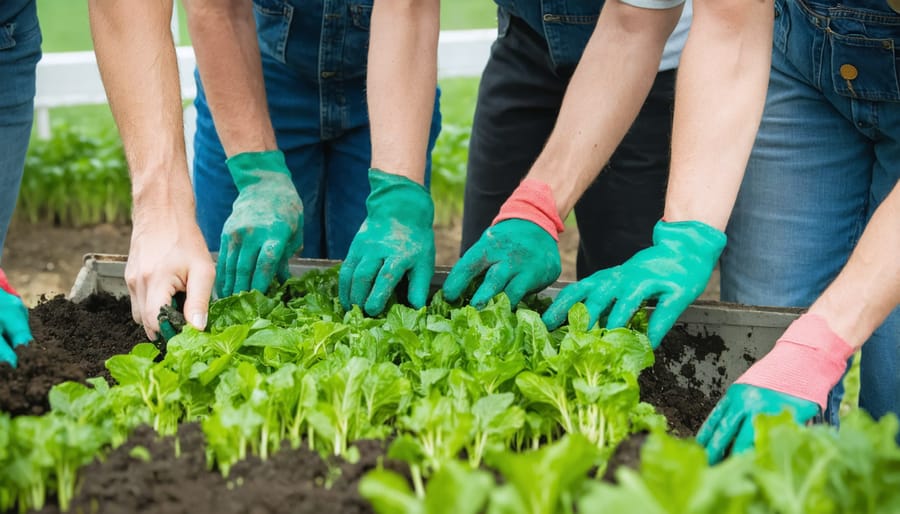
Economic Benefits of Agricultural Education
Cost Savings Through Innovation
Educated farming practices have consistently demonstrated significant cost reductions across Alberta’s agricultural operations. For instance, precision agriculture techniques learned through modern training programs have helped farmers reduce fertilizer usage by up to 20% while maintaining crop yields. A recent study of farms in Central Alberta showed that farmers who completed advanced soil management courses saved an average of $45 per hectare on input costs.
Water management education has proven particularly valuable, with trained farmers reporting 15-30% reductions in irrigation costs through improved scheduling and monitoring techniques. In the Peace River region, farmers implementing integrated pest management strategies learned through extension programs have cut their pesticide expenses by nearly 25%.
Equipment maintenance education has also yielded substantial savings. Farmers participating in machinery maintenance workshops report reducing repair costs by up to 40% and extending equipment life by 3-5 years. Additionally, those trained in financial management and business planning have secured better lending terms and insurance rates, resulting in average annual savings of $15,000 for mid-sized operations.
These cost reductions demonstrate how educational investments consistently deliver positive returns for Canadian farming operations.
Market Access Opportunities
Agricultural education equips farmers with the knowledge and skills needed to explore innovative market opportunities and diversify their income streams. Through specialized training programs, farmers learn to identify and access premium markets, particularly in organic and sustainable agriculture sectors where Canadian products command higher prices.
Education helps farmers understand market trends, certification requirements, and quality standards that can increase their products’ value. Many Alberta farmers have successfully transitioned to direct-to-consumer sales, farmers’ markets, and specialty crop production after completing targeted educational programs.
Digital literacy training enables farmers to leverage e-commerce platforms and social media marketing, connecting directly with urban consumers and food businesses. Understanding supply chain management and food safety regulations opens doors to institutional buyers, restaurants, and export markets.
Additionally, knowledge of value-added processing allows farmers to transform raw products into premium goods, significantly increasing profit margins. Networking opportunities through educational programs often lead to valuable partnerships and cooperative marketing arrangements, strengthening farmers’ market position and bargaining power.
Agricultural education continues to be a powerful force in transforming Canada’s farming landscape, equipping producers with the knowledge and skills needed to face modern agricultural challenges. As we’ve seen throughout Alberta and beyond, farmers who engage in ongoing education consistently demonstrate improved productivity, sustainability, and economic outcomes.
The future of farmer education holds exciting possibilities, from advanced digital learning platforms to innovative hands-on training programs. These opportunities are becoming increasingly accessible, with many institutions offering flexible learning options that accommodate the demanding schedules of active farmers. The integration of traditional farming wisdom with cutting-edge research and technology creates a robust foundation for the next generation of agricultural leaders.
Looking ahead, we can expect to see more personalized learning pathways, increased collaboration between educational institutions and industry partners, and greater emphasis on sustainable farming practices. The growing network of farmer-to-farmer mentorship programs across Canada demonstrates the value of peer learning and community support in agricultural education.
For Canadian farmers, investing in education isn’t just about individual growth—it’s about strengthening our agricultural communities and ensuring food security for future generations. As climate patterns shift and market demands evolve, the ability to adapt through continuous learning becomes not just an advantage, but a necessity for modern farming success.
By embracing educational opportunities today, farmers position themselves to become more resilient, innovative, and successful stewards of the land tomorrow.


